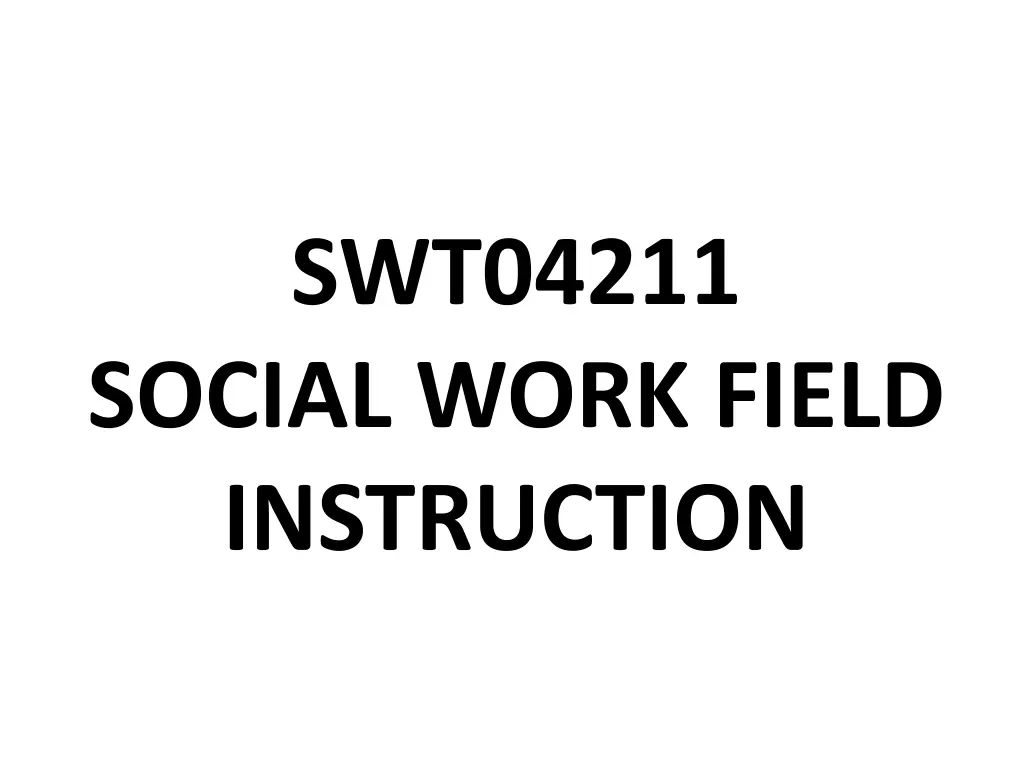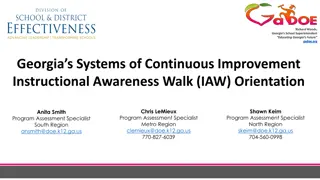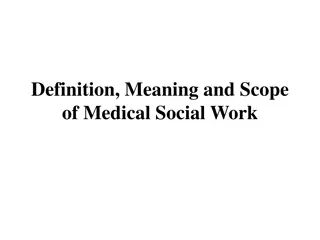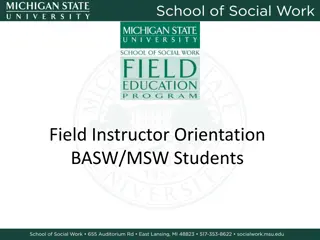
Understanding Social Work Field Instruction
Explore the essential concepts of social work field practice, including the meaning and objectives of field education. Discover the importance of fieldwork, key actors, and their roles in the practice. Engage in activities to define social work terms and enhance professional skills in the field.
Download Presentation

Please find below an Image/Link to download the presentation.
The content on the website is provided AS IS for your information and personal use only. It may not be sold, licensed, or shared on other websites without obtaining consent from the author. If you encounter any issues during the download, it is possible that the publisher has removed the file from their server.
You are allowed to download the files provided on this website for personal or commercial use, subject to the condition that they are used lawfully. All files are the property of their respective owners.
The content on the website is provided AS IS for your information and personal use only. It may not be sold, licensed, or shared on other websites without obtaining consent from the author.
E N D
Presentation Transcript
SWT04211 SOCIAL WORK FIELD INSTRUCTION
Topic 1 : Concepts of Social Work Field Practice
Learning Tasks By the end of the topic learners are expected to: Explain the meaning of social work field education Explain aims of Social Work Field Education Explain objectives of Fieldwork Practicum
Cont Explain importance of Fieldwork Identify key Actors in Fieldwork Practice Identify roles of key actors in fieldwork
Definition of Social Work Field Education
Activity1: Buzzing Buzz on the following question: Define Social Work, Social Work Field Education and related terms (if any)
Social work Social work is the professional activity of helping individuals, groups, or communities enhance or restore their capacity for social functioning creating societal favorable. to and conditions
Field education Field education in social work is experiential form learning in which (learner) is helped to:- Consciously bring knowledge to the practice situation. teaching the and student selected
Cont competence Develop performing practice skills Learn to practice within the frame-work of social work values and ethics in
Cont Develop a professional commitment to social work practice Evolve a practice style consistent with personal capacities Develop the ability effectively within a social agency. strengths and to work
Aims of Social Work Field Education The overall aim of Social Work field education is to produce professionally reflective, knowledgeable and competent social workers. Through students are oriented to field work rules and procedures as they are planning to undergo practical training. self-evaluating, field education,
Cont It is an instrument that is used to initiate students into the profession through among others, inculcation and assimilation values, ethics and principles. Aims of field instruction can be summarized in the following manner: of social work
Cont To enable the students apply, (in real life situations but under the careful guidance of a social work agency) some of the knowledge, skills and attitudes acquired in the classroom. To enable the school to evaluate the student s ability to perform grow and develop as a professional person and at the same time to evaluate the school educational programme.
Cont To serve as channel of information in feeding back to the school the changing needs of the field which can then be incorporated in the social work educational programme. meaningfully
Objectives of Fieldwork Practicum
Activity: Small group discussion Discuss the following question below: Discuss the objectives of field education
Objectives of Fieldwork Practicum The overall objective of field work practicum is to give students an opportunity to apply theories and knowledge leant in class room into real life setting. The main objectives of field practicum at NTA level 4, 5 and 6 are:-
Cont To enable students apply, (in real life situations but under the careful guidance supervision of a competent social worker) some of the knowledge, skills and attitudes acquired in the classroom. and
Cont To enable the school to evaluate the student s ability to perform, grow and develop professional person and at the same time to evaluate the school educational programme. as a
Cont To information in feeding back to the school the changing needs of the field which can then be meaningfully incorporated in the social work programme. serve as channel of educational
Importance of Fieldwork Fieldwork instruction in social work training has many benefits which include the following:- as a method of
Opportunity to translate theoretical knowledge into practice Fieldwork is intended to help a student to translate content covered in the classroom to real life situations as part of a student s preparation to become a professional social worker. theoretical
cont It is through opportunities to practice that students assimilate the social work principles, values and ethics of the profession. It takes more than academic fitness, but also knowledge, field- tested skills and a wealth of hands- become a fully backed social worker evidence-based on-experience to
Alignment and appropriateness Fieldwork is an opportunity for bring into line theoretical knowledge and learning with the needs of society and the marketplace. Through fieldwork students have opportunities to translate the acquired theory into practice which affords them a chance to realize what works and what may not work in different social work settings.
Cont Fieldwork also provides students with the opportunity to take responsibility for addressing people s Theory informs practice and practice informs theory so through fieldwork, new knowledge is developed while testing the already acquired knowledge. problems.
Cont Therefore, if executed effectively, fieldwork becomes an important tool in developing a social work curriculum that is appropriate and responsive to topical social development issues.
Socialization Fieldwork is socialization since it prepares the student for future roles as a social work practitioner. It also contributes to the development of a professional identity, using critical self-reflection in their practice at an early stage. an instrument of
Cont In social work, field education is the signature pedagogy, the central form of instruction and learning profession socializes its students (CSWE EPAS, 2008, p.8). The general purpose of fieldwork is therefore, to acquaint students with actual social preparation for professional social work practice. in which a work situations in
Skills building Fieldwork also enables students to acquire skills appropriately to the needs of clients and society in general. Examples of such skills include engagement and rapport building, intervention and termination that are central to the problem solving process. for responding assessment,
Key Actors in Fieldwork Practice and their Roles The main actors in the field work include; department of social work, Fieldwork coordinator, consultant, social agency supervisor and social work students. Field work agency, service
Cont The roles of each actor need to be properly understood from the onset in order to facilitate a meaningful organization and experience of fieldwork.
Activity: Small group discussion Into small manageable groups discuss the following question below: Discuss the roles of key implementers in field education
Roles of key implementers in field education
The Agency The social agency in which the placement occurs significant role. The agency must be committed to participating in the educational effort from its board down to its staff if the student is to have the maximum opportunity of learning. also plays a
Cont The agency must be ready to offer or provide quality services to its clientele for the benefit of the student. The agency administrator (field coordinator) is the central person who can assist the field instructor to prepare for the role, provide space, resources for care and maintenance of field program.
The Field Instructor The field instructor has the role of teaching the student, read the student s work and at the same time participate in the school s varied activities Instructors. for Field
Cont He or she is a link between the school and the agency in the instructional process. This is a difficult task knowledge of both the school and the agency. which requires
Cont As a field instructor, he/ she has the responsibility for individualizing the learning opportunities to best meet the needs of each student. She should acquire skills in educational assessment as well as skills in teaching in order to be the competent field instructor.
The Student The student cannot be a passive learner in field instruction. He or she is required to participate in shaping the learning experience to meet his or her individual learning needs.
Cont Though their learning objectives developed by service orientation and goals of the agency, the student as an adult learner should be ready to negotiate and seek for learning experience. the school, and an individualized
Cont Field instruction is often an assumption and that the students are functioning as an adult learner and who is able to assume responsibility for the learning experience. expectations
The Client The client or client system cannot be ignored in the process of Field Instruction. There has to be careful planning by all parties to assure that the quality of service to clients is not seriously compromised for the sake of student learning.
Cont Clients have a right to expect they seek help from social agencies. Therefore the field instructor the agency administrator, should meet and discuss if there are problems regarding delivery by the student or agency. when and student the service
Cont Once roles and responsibilities of each party in field instruction are clear considerable effort is still required to maintain linkages which facilitate the desired interaction of the parties. establish and
Cont The process is sometimes loaded with issues constant attention. should devote considerable effort to resolve or minimize problems by maintaining positive relationships. which demand parties All working
Key Points Field instruction is a central part of social-work professional education and provides students opportunity to practice and integrate theory in the guidance and instruction experienced field instructor. with an field under the an of
Evaluation What is social work field education? What are the aims of Social Work Field Education? What are the objectives of Fieldwork Practicum? What is the importance of Fieldwork?
References: Cooper L & Briggy L (2000) Fieldwork in the human services, theory and practice for field educators, practice teachers and supervisors, Allen & Unwin, St. Leonards Dhemba, J. (2012). Fieldwork in social work education and training: issues and challenges in the Case of Eastern and Southern Africa. Available on www.socwork.net/sws/article/ view/310. Accessed on 3, December 2016.
Cont Parker J (2008).Effective practice learning in social work, Learning Matters Ltd, Southernhay East. URT(2017) Field practicum manual for certificate and diploma in social work
End of topic 1 Questions/comments






















